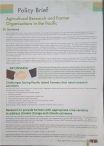In general, PIFON is working to get more farmer organisations directly involved in agricultural development projects in the region. In order to achieve this, PIFON is working to highlight the good work that farmer organisations are already doing in relation to research and extension in the region. PIFON has released two policy briefs on this subject which are available on the web. The brief on Agricultural Research and Farmer Organisations in the Pacific is accessible on the web via http://www.pacificfarmers.com/wp-content/uploads/2016/03/Agricultural-Research-and-Farmer-Organisations-in-the-Pacific-1.pdf whilst that on Agriculture Extension and Farmer Organisations in the Pacific is accessible via http://www.pacificfarmers.com/wp-content/uploads/2016/03/FOs-and-Agricultural-Extension-Policy-Brief.pdf
The policy briefs have been completed, printed and disseminated within the region via co-funding between IFAD’s MTCP II and SPC PAPP programmes. The briefs entitled “Agricultural Research and Farmer Organisations in the Pacific” and “Agricultural Extension and Farmer Organisations in the Pacific” address the following: agricultural import substitution and the tourism fresh produce supply gap; barriers to Inter-regional agricultural trade in the Pacific and address challenges of climate change with farmer organisations.
These policy briefs were sent out via e-bulletins to the PIFON newsletter subscriber network and have been handed out in national/regional and international forums which PIFON members have attended for example, the Farmers Forum in Rome and the IFAD Indigenous Peoples Forum Pacific Regional Consultation Workshop in Fiji.
At whatever forums/conferences that PIFON representatives have been invited to, the briefs have formed the basis of the presentations for the role of PIFON.
FOs and Agricultural Research
Related to agricultural research, the policy brief concludes that “a partnership between agriculture ministries, relevant public sector organisations and farmer organisations will increase the depth and quality of agricultural research as well as see more comprehensive and widespread adoptions of the results”.
Research can be carried out by working with FOs directly, this would mean that more farmers within the FO is engaged in research, the farmers are taught how to keep data and how to watch for details. The Policy Brief cites examples of research that has been undertaken by FOs and how it is very relevant as it captures actual on field and real life experiences and farmer observations that can then be quickly adopted by other farmers as best practise.
The Pacific Breadfruit Program under the ACIAR project was a case study on how this model works and how Government may want to take notice of this emerging model for real field test sites for research purposes.
FOs and Agricultural Extension
Related to agricultural extension, the policy brief stresses that “farmer organisations can effectively and efficiently complement the work of government and aid agencies by extending the outreach of support to farmers”.
Case studies of private extension services currently being undertaken by FOs is recorded in PIFON’s Policy Brief. Like the Research Policy Brief it exemplifies the power and the reach of FOs by teaching one and the one teaching the group. This is the new model of extension that is emerging where private or FOs or commercial companies have their own extension officers who help outgrower farmers in pulling products through to the market.



Comments are closed